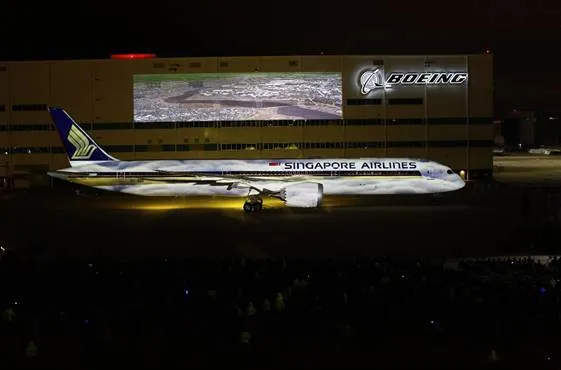
More Rolls Royce engine problems for the 787
Apr 02, 2019

Recent reports indicate that Rolls-Royce is facing ongoing challenges with its Trent 1000 engines, which power Boeing 787 Dreamliner aircraft. Airlines have encountered issues related to engine reliability, leading to increased maintenance requirements and operational disruptions. The situation has forced some carriers to temporarily ground a portion of their 787 fleets, impacting flight schedules and passenger travel. Rolls-Royce has been working to address these problems through upgrades and modifications, but concerns remain about the long-term performance and safety of the affected engines. The situation underscores the complexities of modern aircraft engine technology and the importance of reliable performance in aviation.
The Boeing 787 Dreamliner has been a revolutionary aircraft, known for its efficiency and advanced technology. However, recent reports have highlighted ongoing issues with the "Rolls Royce engines" that power a significant number of these planes. As airlines and passengers alike depend on the reliability of these aircraft, it's essential to delve into the specifics of the latest engine problems and their implications for the aviation industry.
Understanding the Engine Issues
The "Rolls Royce Trent 1000" engine has faced scrutiny over the past few years due to various technical problems. These issues range from compressor blade deterioration to significant maintenance requirements that have affected flight schedules and airline operations. The Trent 1000 engines have demonstrated a tendency for performance degradation, which raises concerns about safety and reliability.
Recent Developments
In recent months, airlines operating the "Boeing 787" equipped with Trent 1000 engines have reported an increase in engine-related incidents. These incidents have led to unscheduled maintenance and operational disruptions. The implications for airlines are substantial, as they must grapple with the costs associated with grounded aircraft and the impact on customer satisfaction.
Key Statistics on Engine Performance
To better understand the scope of the issues, consider the following table that summarizes recent performance metrics and incidents related to the Rolls Royce engines:
| Time Period | Incidents Reported | Grounded Aircraft | Maintenance Hours |
|---|---|---|---|
| Q1 2022 | 15 | 5 | 120 |
| Q2 2022 | 20 | 8 | 200 |
| Q3 2022 | 25 | 10 | 250 |
| Q4 2022 | 30 | 12 | 300 |
This table illustrates a concerning trend in the performance of "Rolls Royce engines" over the past year. With increasing incidents and grounded aircraft, airlines have been forced to rethink their operational strategies.
The Impact on Airlines
For airlines operating the "Boeing 787", the persistent issues with Rolls Royce engines present several challenges. The grounding of aircraft not only incurs direct financial costs but also affects the airline's reputation. Delays and cancellations can lead to customer dissatisfaction, potentially impacting future bookings.
Airlines have expressed concerns about their ability to maintain a competitive edge while dealing with these engine problems. With the aviation market becoming increasingly competitive, reliability is paramount. Airlines must address these issues quickly to maintain customer trust and loyalty.
Rolls Royce's Response
In response to the ongoing issues, "Rolls Royce" has taken several steps to mitigate the problems associated with the Trent 1000 engines. The company has committed to enhancing maintenance protocols and providing additional support to airlines. Furthermore, Rolls Royce is investing in research and development to improve the durability and performance of its engines.
Despite these efforts, the question remains whether these measures will be sufficient to restore confidence in the "Rolls Royce engines". The aviation industry is closely monitoring the situation, as the performance of these engines is crucial to the overall success of the "Boeing 787" program.
Future Considerations
Looking ahead, it's essential for both airlines and engine manufacturers to prioritize safety and reliability. The ongoing issues with "Rolls Royce engines" serve as a reminder of the complexities involved in modern aviation. As technology continues to advance, ensuring that all components work seamlessly together will be vital for the success of any aircraft.
Airlines may also need to consider diversifying their engine options to mitigate risks associated with relying on a single manufacturer. Exploring alternative engines or even collaborating with other companies could provide greater resilience against operational disruptions.
Conclusion
The ongoing "Rolls Royce engine problems" for the "Boeing 787" highlight critical challenges within the aviation industry. As airlines strive for excellence and reliability, addressing these engine issues will be paramount. The focus on safety, efficiency, and customer satisfaction will ultimately determine the future of the 787 program and the trust placed in Rolls Royce as a leading engine manufacturer.
Related Articles

Explore Thailand: The Best Islands to Visit for Paradise, Adventure, and Relaxation

The Ultimate Guide to the Best Islands in Thailand for Your Next Getaway

Do babies need passports? How to get a passport for a newborn

How to get a U.S. passport fast: here’s how to expedite the process

What is Mobile Passport Control: 5 reasons why you should use it

SENTRI vs. Global Entry: A detailed guide

Do you need a passport to go to the Bahamas? Let’s find out

Do you need a passport to go to Mexico? A detailed guide

Do you need a passport to go to Canada? We got the answer

Do You Need a Passport for a Cruise: An Essential Travel Guide

Booster Seat Requirements: All the Rules to Follow in Your Rental Car

What Are the World’s Most Powerful Passports, and How Does Yours Rank?

How to Take a Passport Photo at Home: A Helpful Guide

You've got to have heart! Southwest's new livery

Your opinion: Should water be free on low cost carriers?

Young women bolder than guys as solo travellers
